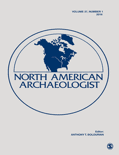
NORTH AMERICAN ARCHAEOLOGIST
Scope & Guideline
Advancing Knowledge of North America's Rich Heritage
Introduction
Aims and Scopes
- Interdisciplinary Approaches:
The journal emphasizes the integration of various disciplines such as anthropology, history, and environmental science to provide a holistic view of archaeological findings. - Indigenous Perspectives:
A significant focus is placed on incorporating Indigenous knowledge and perspectives, particularly in studies related to colonization, cultural heritage, and decolonization efforts. - Technological Innovations:
The journal frequently publishes research that utilizes advanced technologies such as machine learning, geochemical analysis, and acoustic archaeology to analyze artifacts and sites. - Regional Archaeology:
There is a strong emphasis on the archaeology of specific regions within North America, including detailed studies of settlement patterns, subsistence strategies, and social networks. - Environmental and Climate Considerations:
Research addressing the impact of environmental changes, such as climate shifts and natural disasters, on past human societies is a recurring theme. - Material Culture Studies:
The examination of artifacts, particularly lithic tools and pottery, is a core area, with studies focusing on production, use, and cultural significance.
Trending and Emerging
- Climate Change and Archaeology:
Research addressing the implications of climate change on archaeological sites and the historical context of human adaptation to environmental shifts has gained prominence, reflecting a growing concern for sustainability and heritage preservation. - Decolonization and Indigenous Rights:
An increasing number of articles focus on collaborative approaches to archaeology that prioritize Indigenous voices and decolonization, underscoring the importance of ethical practices in archaeological research. - Technological Integration in Archaeology:
The use of cutting-edge technologies, such as machine learning and portable X-ray fluorescence, is becoming more common, showcasing a trend towards innovative methodologies that enhance data analysis and interpretation. - Social Networks and Community Interactions:
There is a growing interest in understanding social dynamics and community interactions in archaeological contexts, particularly in studies that explore feasting practices and social structures. - Environmental Archaeology:
The examination of the relationship between humans and their environments, including studies of subsistence strategies and ecological impacts, is increasingly prominent, indicating a trend towards holistic understandings of past societies.
Declining or Waning
- Traditional Historical Archaeology:
Research focused solely on historical archaeology without a broader interdisciplinary context seems to be declining, as authors increasingly incorporate Indigenous and environmental perspectives. - General Overviews of Archaeological Sites:
There is a noticeable reduction in publications that provide basic site overviews without in-depth analysis or new methodological approaches, indicating a shift towards more analytical and innovative studies. - Narrowly Focused Artifact Studies:
Studies that concentrate on singular artifacts without connecting them to broader cultural or environmental narratives appear to be less frequent, as the journal encourages more integrative analyses.
Similar Journals

Origini
Connecting Scholars to the Rich Tapestry of Human History.Origini is a distinguished journal dedicated to the field of archaeology, published by EDIZIONI QUASAR S TOGNON SRL in Italy. With an ISSN of 0474-6805, it offers a platform for researchers and professionals to share their latest findings and insights. Having achieved a significant Q2 ranking in both Archaeology (Arts and Humanities) and Archaeology (Social Sciences) categories according to Scopus, it positions itself as a respected source of scholarly communication in the discipline. Over the converged years from 2017 to 2023, Origini has consistently aimed to advance archaeological research, fostering an environment where innovative theories and methodologies can be developed and discussed. Although it is not an Open Access journal, its contributions remain vital for academics and students seeking to deepen their understanding of archaeological practices and historical narratives. With a commitment to excellence, Origini stands as an essential resource within the archaeological community, inviting contributions that push the boundaries of knowledge and interpretation.

Ethnoarchaeology
Fostering Discovery: Uniting Theoretical and Practical PerspectivesEthnoarchaeology, published by ROUTLEDGE JOURNALS, TAYLOR & FRANCIS LTD, stands at the forefront of interdisciplinary research within the realms of anthropology and archaeology. With an ISSN of 1944-2904 and an E-ISSN of 1944-2890, this journal has demonstrated an impressive impact, categorized in the Q1 quartile for both anthropology and archaeology as of 2023. Acknowledged for its influence, it ranks 72/413 in Archeology (arts and humanities) with an impressive 82nd percentile, making it a vital resource for researchers and practitioners. Over its converged years from 2014 to 2024, the journal aims to bridge theoretical and practical aspects of ethnoarchaeology, fostering a deeper understanding of cultural practices through archaeological perspectives. Its commitment to advancing knowledge in this unique field is of utmost importance for academics, professionals, and students dedicated to exploring the interplay between contemporary societies and historical archaeological practices.
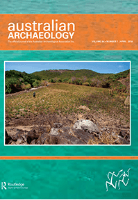
AUSTRALIAN ARCHAEOLOGY
Unearthing Australia’s Rich Heritage.AUSTRAILIAN ARCHAEOLOGY, published by Taylor & Francis Ltd, is a leading academic journal dedicated to the field of archaeology. With a strong reputation as evidenced by its Q1 ranking in both the Arts and Humanities and Social Sciences categories, this journal fosters the growth and dissemination of pioneering research from diverse archaeological contexts. The journal has been a vital resource for scholars and practitioners since its convergence in 2002, supporting the collective advancement of knowledge in the archaeological discipline. By offering a platform for rigorous analysis and critical discussions, AUSTRAILIAN ARCHAEOLOGY appeals to a wide audience, from established researchers to students beginning their journey in archaeology. Although it is not an Open Access journal, the insights provided are invaluable for enhancing understanding and appreciation of Australia’s rich archaeological heritage. With a Scopus ranking that places it among the top contenders in its field, this journal continues to contribute significantly to outstanding archaeological scholarship and professional practice.
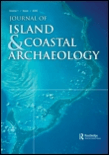
Journal of Island & Coastal Archaeology
Diving Deep into Island Archaeological DiscoveriesThe Journal of Island & Coastal Archaeology, published by Routledge Journals, Taylor & Francis Ltd, stands as a leading publication in the fields of archaeology, ecology, and history, boasting a prestigious Q1 ranking in multiple categories as of 2023. Since its inception in 2006, this journal has been a vital resource for researchers, professionals, and students interested in the rich archaeological heritage of island and coastal regions. With an impressive Scopus ranking that places it in the top tiers of both Arts and Humanities and Social Sciences, it offers insightful studies and innovative methodologies that address the complexities of human interactions with marine and terrestrial environments. The journal aims to advance knowledge and promote discussion through rigorous peer-reviewed articles, fostering a deeper understanding of indigenous cultures and their environmental contexts. While currently not offering an open-access model, the journal remains committed to disseminating high-quality research crucial for shaping future archaeological scholarship.

Kratkie Soobshcheniya Instituta Arkheologii
Pioneering Insights in the HumanitiesKratkie Soobshcheniya Instituta Arkheologii is a prestigious academic journal published by IZDATELSTVO NAUKA, specializing in the fields of archaeology and history. With an ISSN of 0130-2620, this journal has established itself as a vital resource for scholars, researchers, and students engaged in the humanities, particularly within the Russian Federation. Recognized for its high-quality contributions, it has achieved a remarkable Q1 ranking in both Archaeology and History for the year 2023, demonstrating its significant impact and relevance in these disciplines. Although it does not provide open access, the journal's robust positioning in Scopus — ranking #634 in History and #208 in Archaeology — further attests to its scholarly authority and the insightful research it disseminates. The journal covers a comprehensive range of topics, facilitating a deeper understanding of archaeological practices and historical methodologies, thereby fostering academic dialogue and knowledge advancement from 2018 through 2024. Addressing an international audience of professionals and students alike, Kratkie Soobshcheniya stands as a cornerstone for innovative research in archaeology and history.
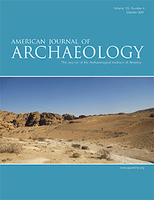
AMERICAN JOURNAL OF ARCHAEOLOGY
Decoding the Past for Tomorrow's ScholarsThe American Journal of Archaeology (ISSN: 0002-9114, E-ISSN: 1939-828X), published by the esteemed University of Chicago Press, stands as a leading scholarly journal in the field of archaeology, celebrated for its rigorous peer-reviewed research. With an impressive impact factor that places it in the Q1 quartile for both archaeology and archaeology within the arts and humanities, this journal ranks among the top 15% in its field, according to Scopus metrics. It serves a global audience of researchers, professionals, and students, facilitating the dissemination of innovative findings from excavations, historical analyses, and methodological advancements. While primarily available through subscription, the journal's archives and features provide invaluable resources for deepening one's understanding of the past and engaging with current archaeological discourse. Operating from its home in Chicago, USA, the American Journal of Archaeology actively contributes to the advancement of knowledge and scholarship in archaeology, making it an essential platform for those invested in the exploration of ancient civilizations and cultural heritage.

Studijne Zvesti Archeologickeho Ustavu Slovenskej Akademie Vied
Advancing archaeological knowledge, one study at a time.Studijne Zvesti Archeologickeho Ustavu Slovenskej Akademie Vied is a leading journal in the field of archaeology, published by the SLOVENSKA AKAD VIED, ARCHEOLOGICKY USTAV, based in Nitra, Slovakia. This esteemed journal, with the ISSN 0560-2793, has established itself as a vital resource for scholars and researchers, reflecting significant academic contributions in both the arts and humanities as well as social sciences. With a 2023 Scopus ranking placing it in the second quartile (Q2) for archaeology, it showcases rigorous research and innovative methodologies, essential for advancing archaeological studies. While it is not an Open Access journal, it continues to offer valuable insights into archaeological findings, theoretical frameworks, and interdisciplinary approaches. The journal serves as a bridge, connecting local Slovak archaeology with international discourse, making it an indispensable tool for students, professionals, and academics striving for a deeper understanding of the archaeological heritage of Slovakia and beyond.

Azania-Archaeological Research in Africa
Unearthing Africa's Rich Heritage.Azania-Archaeological Research in Africa, published by Routledge Journals, Taylor & Francis Ltd, stands as a premier academic resource in the field of archaeology, specifically focusing on African archaeological research. With a remarkable tradition dating back to 1966, the journal spans over half a century of rigorous scholarship, aiming to enrich our understanding of Africa's diverse cultural and historical narratives. Currently indexed in the prestigious Q1 category for both Archaeology and Arts and Humanities, it ranks impressively in the Scopus database, placing within the top 12% of journals in its field. This commitment to excellence facilitates the dissemination of innovative and insightful research, catering to a broad audience of researchers, professionals, and students alike. While the journal is not open access, its impactful contributions continue to shape contemporary archaeological discourse, making it an essential resource for anyone passionate about the study of Africa's archaeological heritage.
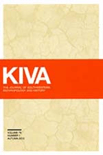
Kiva-Journal of Southwestern Anthropology and History
Pioneering Research in the Heart of the SouthwestKiva - Journal of Southwestern Anthropology and History is a distinguished academic journal published by Routledge Journals, Taylor & Francis Ltd, that serves as a vital resource for scholars in the fields of anthropology, archaeology, and history. With an ISSN of 0023-1940 and an E-ISSN of 2051-6177, this journal has established itself as a significant avenue for scholarly communication since its inception in 1964. It consistently ranks in the top quartiles, including Q1 in Archaeology and Q2 in Anthropology, reflecting its high impact and rigorous peer-review process. Covering a wide array of topics pertinent to the Southwestern United States, Kiva invites original research articles, reviews, and methodological papers that advance understanding of the region's rich cultural heritage and historical narratives. While currently not open access, its commitment to disseminating quality research makes it an essential reading for researchers, professionals, and students aiming to explore the multifaceted dimensions of southwestern studies.

JOURNAL OF THE POLYNESIAN SOCIETY
Exploring the Depths of Polynesian CultureJOURNAL OF THE POLYNESIAN SOCIETY, published by Polynesian Soc Inc, is a distinguished periodical that aims to disseminate high-quality research in the fields of anthropology, archaeology, and cultural studies. With an ISSN of 0032-4000 and E-ISSN 2230-5955, this journal serves as a key resource for scholars and practitioners interested in the rich historical and cultural narratives of the Polynesian region. Since its inception, the journal has published a multitude of scholarly articles, reflecting a convergence of research from 1971 to 2022, thus establishing itself as a foundational text within its domain. The journal is indexed in notable categories with a Q4 ranking in anthropology and a Q3 in both archaeology and cultural studies as of 2023, highlighting its relevant contributions to the academic community. Moreover, its impressive Scopus ranks position it within the 80th percentile for archaeology and the 67th percentile for anthropology, showcasing its dedication to scholarly excellence. Although not an open-access publication, the journal remains a vital avenue for academic discourse and exchange, making it a significant resource for researchers, professionals, and students dedicated to understanding the diverse cultures of the Pacific Islands.